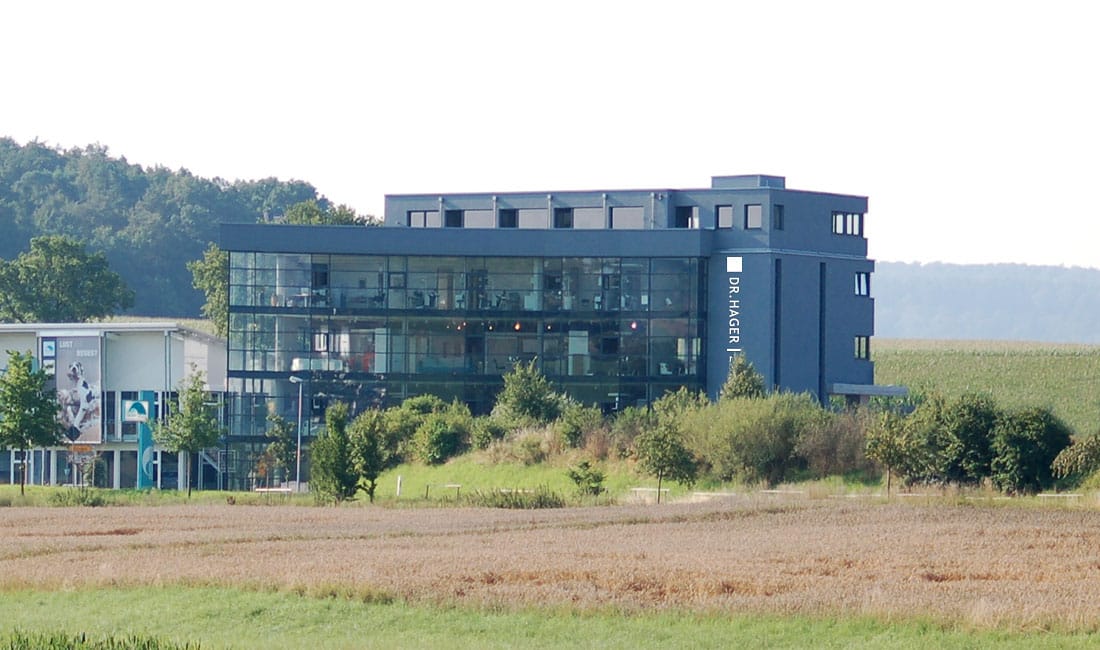Your specialist for dental implants
We will be happy to advise you in detail on the possibilities of modern implantology. As experts, we provide even complex dental situations with fixed teeth within one day – inexpensive, high quality and durable for your health.
- 3 Implant specialists DZGI© (unique in Germany)
- Over 20,000 implants placed (ceramic and titanium)
- Fixed price guarantee for all implant treatment offers
- Family practice for 40 years, now in its 2nd generation

Certified specialist practice for implantology
Our practice is certified as an implantology specialist practice by the German Society for Implantology(DGI) and Germany’s oldest implant society for implantology, the DGZI. We carry out almost 1,000 dental implantations and bone augmentation operations (augmentations) on an outpatient basis every year.


More quality of life with dental implants
Dental implants are an ideal replacement for missing teeth. In place of the lost tooth, the implantologist places an artificial tooth root, which after a few weeks has grown extremely firmly into the jawbone.
A dental crown, dental bridge or denture can then be attached to such a dental implant. A new tooth is created, durable and compatible.
Cost-effective and high-quality dental implants thanks to the DR. HAGER | FIIC-concept©
Dental implant restorations with a high ceramic content are a technical and biological quality feature. Thanks to our location advantage, many years of experience and the fully integrated processes of the prosthetics and dental technology departments, we can provide you with affordable dental restorations with up to 100% ceramic content.
-
Everything from a single source and under one roof
Even in complex treatment cases, our team will carry out your entire treatment in our practices. -
Improved price-performance ratio
Thanks to our funded Research Development project from 2022, we were able to achieve a higher level of digitalization. This has made services even more attractive in terms of price. -
Experience from over 20,000 implants placed
41 years of experience helps us to routinely lead even difficult cases to success. This includes, for example, cases with planned bone augmentation. -
Use of modern, minimally invasive surgical procedures
We use an implantation procedure that is particularly gentle and precise. Digitally navigated implantation with the aid of DVT data is a key feature here. -
Financial security and transparency
The price quoted in our offers is a fixed price and will not be exceeded. Individual installment payments without third-party providers are possible.

Testimonials from our patients
Das Team ist mega freundlich und professionell. Die Behandlung war angenehm, schmerzfrei und schnell erledigt. Die Praxis ist top modern und super sauber. Fühle mich dort immer gut aufgehoben kann ich nur empfehlen.
Das Dentalhygieneteam arbeitet sehr professionell und gründlich mit moderner Apparatur
Die Implantologen und Zahnärzte arbeiten sehr professionell mit den neusten Techniken und Einrichtungen
Vor einem möglichen Eingriff wird man umfassend beraten. Nachdem der Profi das Röntgenbild analysiert und Lösungswege aufgezeigt hat, wird der beste gangbare Weg gemeinsam gesucht. Man hat dann Zuhause genug Zeit, die Offerte zu akzeptieren oder eben nicht.
Wir sind mit Allem bei Dr. Hager rundum zufrieden!
Dr. Hager und sein Team kann ich bestens weiterempfehlen.
Irina war bisher die beste und angenehmste die mich in den vielen Jahren bei Dr. HAGER behandelte.
Vielen Dank
Find out more about our practice in our patient interviews

Experienced specialists for implantology
When it comes to dental implants, experience is essential. Over the past 40 years, we at DR. HAGER have placed around 20,000 implants. This huge wealth of experience is the foundation for being able to perform even difficult cases routinely and painlessly.



When are dental implants used?
Whether just one tooth, several or even all teeth are missing, we will find the optimal solution. After a thorough examination, we draw up an individual treatment plan with a definitive time and cost schedule.
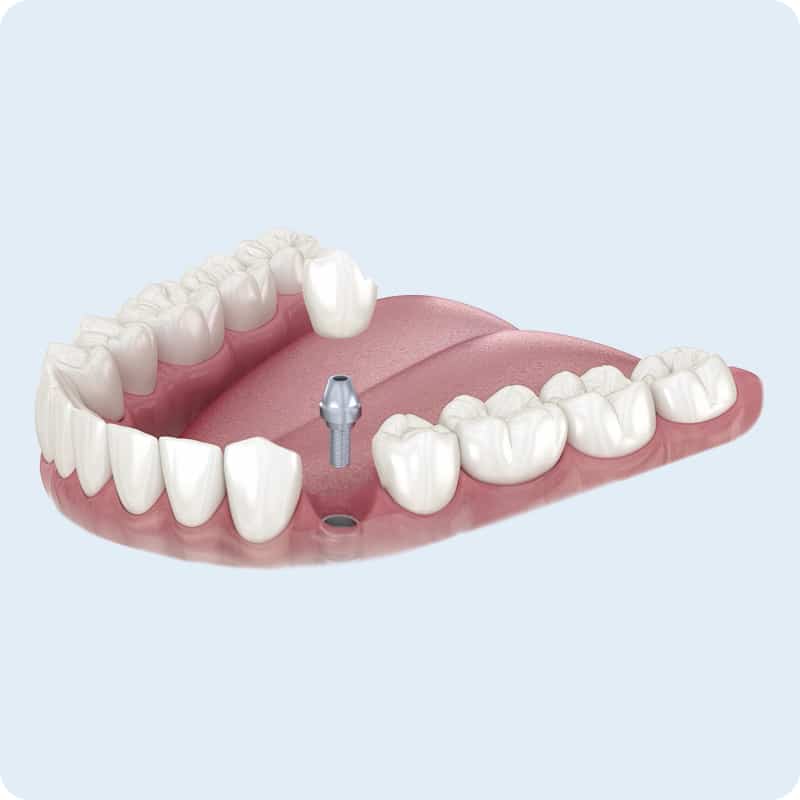
One tooth missing
A single tooth has been lost and the resulting gap can now be closed with a dental implant.
A major advantage is that the healthy neighboring teeth are not used as a bridge support and therefore do not have to be ground down. An implant is also often the better solution from an aesthetic point of view.
The implant acts as a new tooth root and heals in the bone under the gums for approx. 2 months. The white, highly aesthetic all-ceramic crown is then inserted. Our modern ceramic technology perfectly reproduces teeth without metal. A new tooth is created, the gap is closed and patients can bite firmly again from now on.
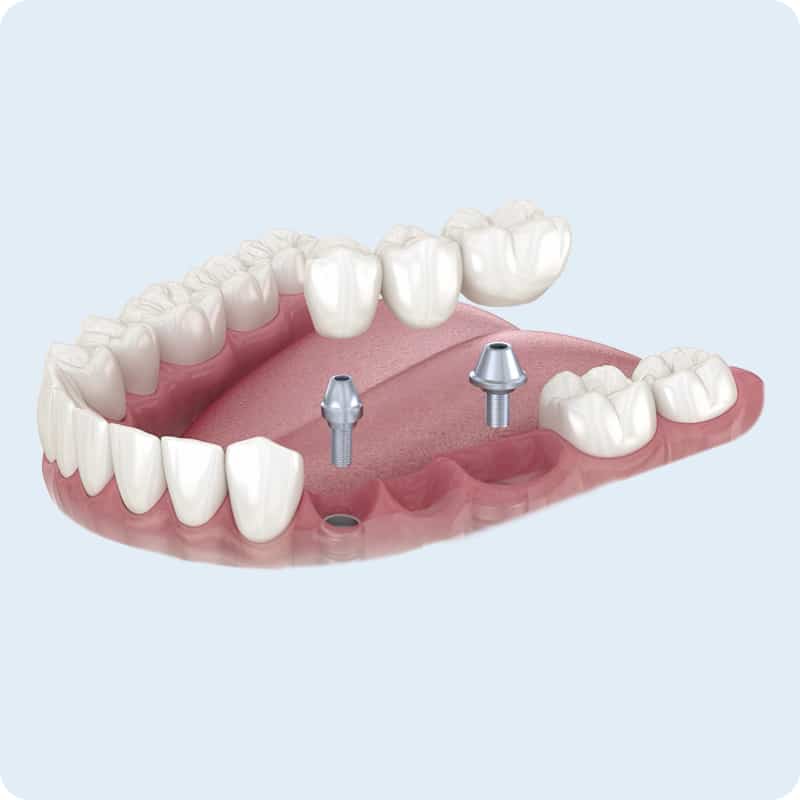
Several teeth missing
Up to 10 all-ceramic teeth can be fixed on just 4 dental implants.
If several teeth have been lost, the correct number of implants is determined by individual planning by a specialist. Decisive factors for the correct distribution of implants are the existing bone and the expected masticatory load.
A special situation arises when several molars are missing at the end of the row of teeth. In such a case, an implant is actually the only solution to support the dentures and give the patient fixed teeth again.
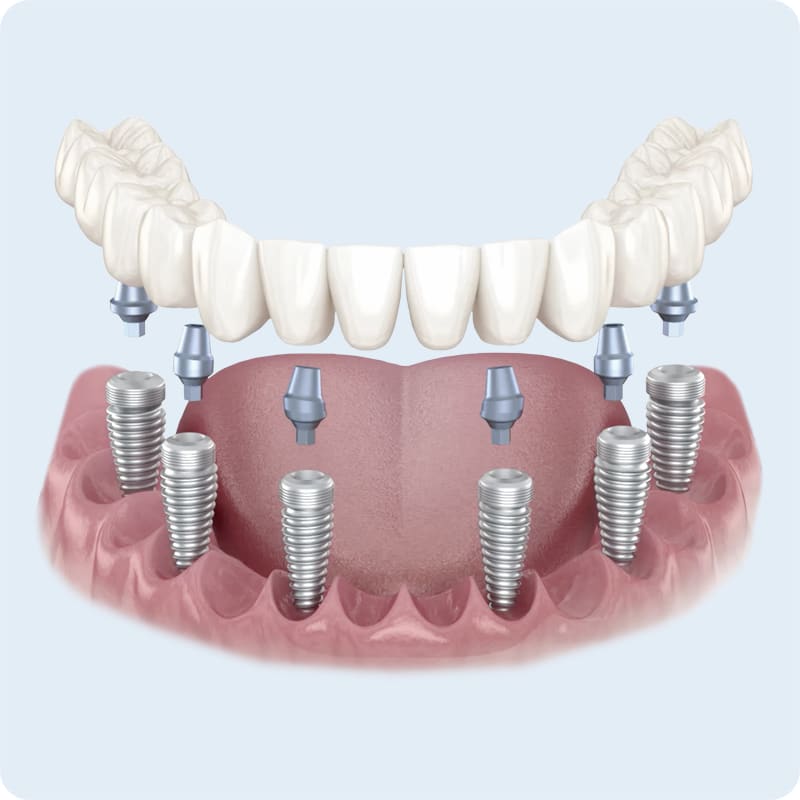
All teeth missing
Even if all teeth have been lost, there is a far more sensible solution than the usual complete denture.
Depending on your needs and wishes, a fixed or removable denture can be supported by dental implants. Many denture wearers complain about poor wearing comfort and painful pressure points.
Implants can provide a remedy thanks to fixed anchoring. Even a new, fixed ceramic dental arch can be attached to several implants. This brings back the former comfort of natural teeth.
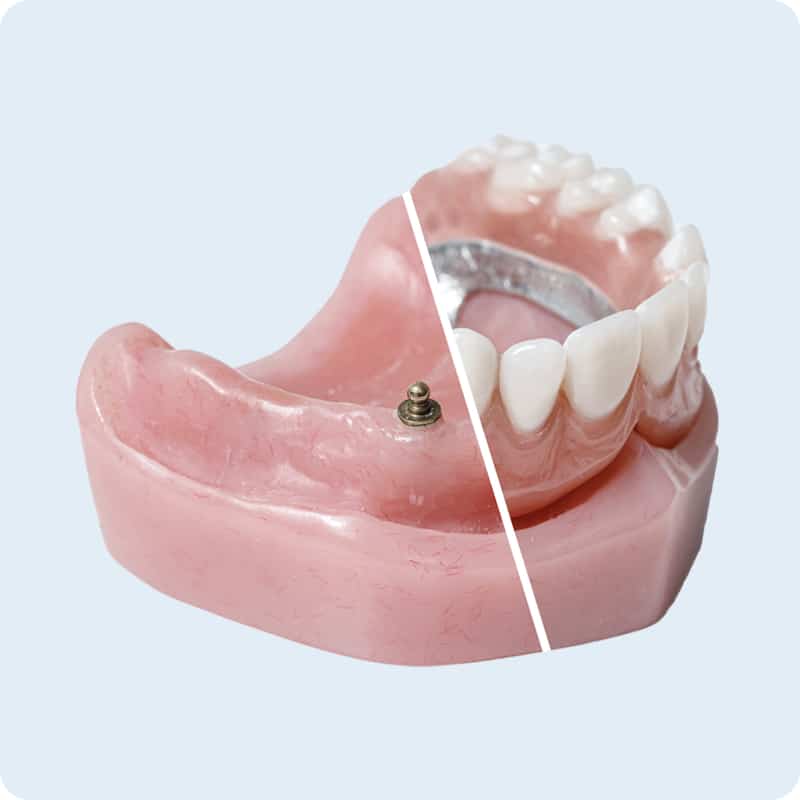
All teeth missing - implant-supported prosthesis
If an all-ceramic bridge is not an option for certain reasons, there is a removable version. Here too, dental implants provide more support.
Many denture wearers complain about the poor wearing comfort of their dentures and painful pressure points. Adhesives or mechanical aids do not solve these problems permanently and satisfactorily. Implants can provide a remedy in such cases thanks to their firm anchoring to the denture. The most comfortable solution is a complete implant-supported prosthesis. Prostheses that are in good condition can usually be connected to the newly placed implants. Ask our specialists during a consultation.
Individual questions about dental implants
We will be happy to answer your individual questions during a free consultation.
- Dental implants made of titanium or ceramic - what are the advantages and disadvantages?
- If I have enough or too little jaw bone, I need bone augmentation
- Are the surrounding teeth firm and free of gum inflammation (periodontitis)?
- How is the compatibility of the implants?

Intraoral scanners: can take digital impressions of teeth and jaws. They replace conventional impression methods and offer a more precise and comfortable solution for patients.
Creation of precise digital 3D scan impressions for the fabrication of dental prostheses on ceramic and titanium implants.
How does implantation work?

Cost-effective initial examination and consultation
To begin with, we invite you to our practice for a cost-effective and detailed consultation. We will discuss all your wishes, options and risks.
Our many years of experience combined with the possibilities of modern diagnostics ensure the best possible preliminary planning of the desired procedure. Digital 3D X-rays and the innovative 3D scan show the jaw conditions very precisely and form the basis for implant planning. Using our software, we can carry out joint live planning. You will then receive a printout of a fixed time and cost plan. This helps patients to make the subsequent decision in peace at home.

The implantation
If you decide to undergo implantation at DR. HAGER, the operation is performed in the following minimally invasive steps:
- After local anesthesia, the available bone is measured intraoperatively using a 3D X-ray.( We also offer treatment under nitrous oxide sedationfor anxious patients )
- The data obtained after pilot drilling is used to create a precisely fitting implant bed.
- A titanium or ceramic implant can then be anchored in the bone. This process is often surprisingly short for our patients and can only be carried out by an experienced implantologist. This gentle, fully integrated implantation technique is an advantage of our practice concept.

The healing phase
The implant now grows naturally and quickly into the bone. Patients hardly have to follow any rules, as the implant usually heals deep under the closed gum.
The healing time depends on factors such as bone quality and bone quantity. Particularly in the days following the operation, you should protect your immune system as much as possible and carry out careful oral hygiene on the closed wound.
After around two months, your bone has firmly integrated the implant and can be digitally scanned precisely and easily with a 3D scan at the next appointment. The in-house master laboratory then uses this 3D impression to produce the highly esthetic ceramic crowns.
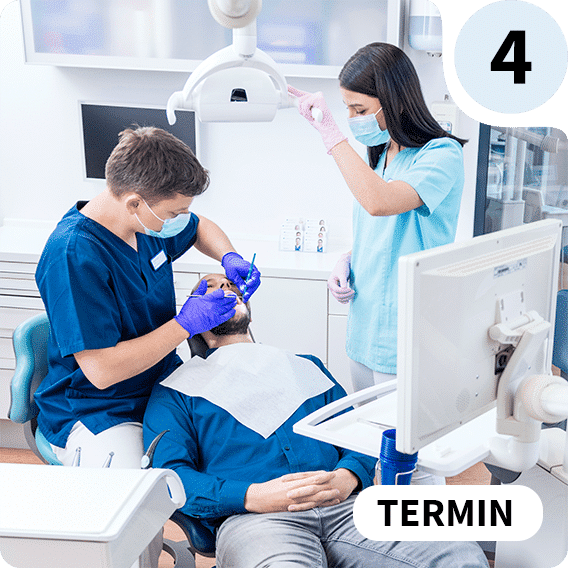
The crown is inserted
After the implant has healed and firmly fused with the bone, the in-house master laboratory has produced the ceramic teeth in our dental laboratory, the specialist can now firmly insert the highly esthetic dental crown onto the implant.
In order to be able to offer patients a long-lasting solution, our dental technicians painstakingly produce these new ceramic teeth by hand with high precision and using biologically certified materials especially for each patient.
Follow-up care in the form of regular dental hygiene appointments at our clinic ensures that the result is sustainable.

“The treatment procedure for an implantation depends on many factors. Bone quality and bone quantity are important pillars of a successful implantation. The use of our 3D X-ray machine is part of our standard procedure for all implantations. Three-dimensional imaging allows us at DR. HAGER | Zahnärzte are able to perform fully navigated implantation. This offers our patients maximum safety and ensures high success rates and our high standards for the benefit of our patients.”
Dominik Hager
Safe drilling in the bone thanks to navigated implantology
To plan the procedure, a computerized tomographic image (“ConeBeam CT”, “DVT”) of the jaw is taken with a prepared template at our clinic. This makes comprehensive planning possible: the type, size and best location of the future implants are planned in advance in three dimensions with computer support. During the surgical session, the implants are guided through a template and placed exactly in the intended position. Immediately afterwards – in the sense of immediate loading (see above) – a previously fabricated temporary or even final denture can be inserted. This is clearly the fastest type of restoration, and the enthusiasm in the media is correspondingly high.

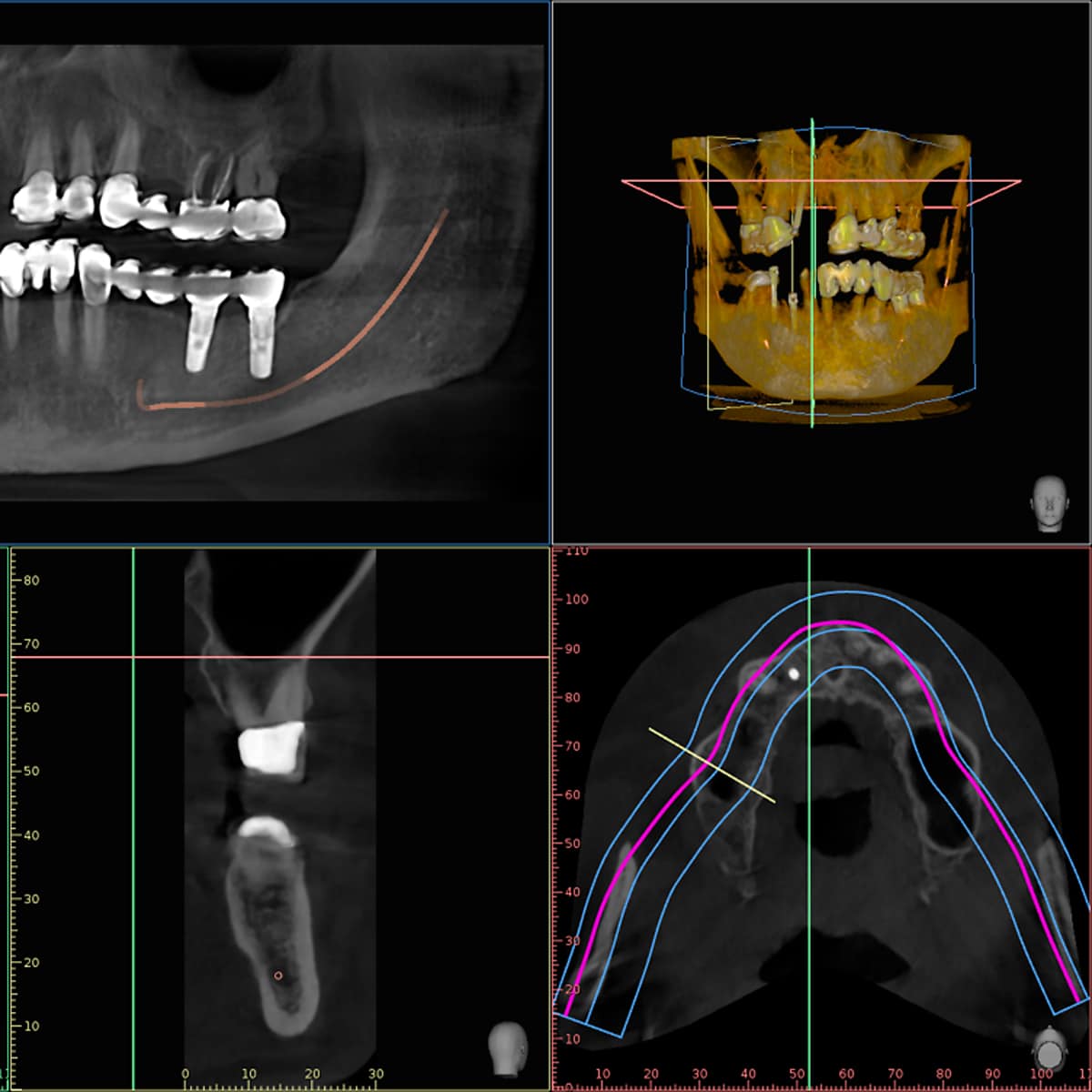

Biocompatible materials
The use of biological therapy solutions is becoming increasingly important in dentistry, and the DR. HAGER | dentists are pioneers in this development and have been focusing on holistic biological therapies for over 35 years. Our approaches not only take esthetics and function into account, but also place a special focus on the compatibility and health of our patients. We understand the importance of the biological regenerative power of bone and gum tissue for the healing process of implants, for example, and use this knowledge for your optimal biological treatment.”
- All-ceramic restorations from implants to dental crowns
- Bone augmentation without exogenous substances
- Inflammation-free for a lifetime
- Our own implant specialists (DGZI®)
Your health and well-being are our top priority. We are able to offer biological dentistry thanks to the treatment and manufacturing processes that only take place in our clinic.
Comprehensive initial examinations at a reasonable price, including a personal treatment folder with a fixed price offer
In a non-binding consultation, you will find out which treatments are necessary for you. At our practices in Konstanz and Bietingen near Schaffhausen, we offer complete solutions including dental implants and dentures. With our experience from over 50,000 treated patients, we will create a treatment plan tailored to your needs. This offer comes with a price guarantee.
You will be informed about the treatment steps, risks, costs and duration of treatment. 3D scans, photos and X-ray images illustrate the treatment process and are included in the printed treatment folder.

Initial examination + free fixed price offer.
This is how dentists work today.

The X-ray image supports the planning of implants. Nowadays, extremely safe navigated implantology is possible in order to protect important anatomical structures.
What does a dental implant cost?
An implant at DR. HAGER | Zahnärzte from 1200 and 1700 euros. In combination with a ceramic crown, it costs between 2800 and 3100 euros. We only use implants from the two largest implant manufacturers in the world: Straumann and Camlog.
Implants made of the biological material ceramic cost between 1400 and 1900 euros.
You will be informed of the exact costs at your first consultation. In addition, we at DR. HAGER | Zahnärzte we offer the advantage of a fixed price guarantee for every treatment plan. No hidden costs with full cost control.
Make an appointment now so that we can make you a non-binding and free offer after a detailed initial examination:
Various surgical procedures in detail
Many paths lead to the goal. This is also the case in dentistry. The many different surgical and insertion procedures for implants have proven to be successful to this day.
However, it is becoming increasingly difficult for patients to keep track of the various surgical procedures for dental implants. The following overview is intended to provide you with an overview of the usual procedures in modern implantology:
Implantology can reliably restore lost teeth. The dentist inserts a new tooth root into the jawbone within a one-hour treatment. The screw-shaped tooth root made of titanium or ceramic must be completely sunk into the bone, so there must be a sufficient amount of bone. In patients with sufficient bone, the implant can be placed directly. If there is a lack of bone, the dentist must first build up the bone. This usually prolongs the healing of the bone by 2-6 months. Bone augmentation can be carried out using various techniques such as the use of autologous bone or synthetic materials to create the necessary stability for the implant. Both approaches offer long-term solutions for the desired tooth replacement and help to restore the functionality and aesthetics of the dentition.
Immediate restoration or immediate implant placement refers to the process in which a tooth is removed in a single session and an implant is then immediately inserted. As a rule, the resulting gap is also immediately filled with a temporary restoration. This method can also be used for dental accidents. Immediate restoration is usually used for unsightly, visible gaps in the front teeth. This means that the gap is closed immediately after treatment.
Immediate loading in implantology makes it possible to load dental implants with a functional temporary crown or bridge immediately after placement. This method offers the advantage that patients regain full chewing function and an esthetic smile in one day. Immediate loading requires a stable jawbone and optimal positioning of the implant. The risk-benefit ratio must be carefully weighed up by the dentist and the patient. We often use immediate loading for large bridge restorations on several ceramic implants. The patient is carefully informed by our competent staff. This minimizes the risk of loss.
Implantation with CT-based navigation is a modern technique that enables precise and minimally invasive dental implantation. A detailed 3D model of the jawbone is created using computer tomography (CT) images. Based on the data obtained, the dentist can plan the optimal position and alignment of the implant. During the procedure, a navigation-based system is used to guide the surgeon in real time and ensure that the implant is placed exactly where planned. This method increases accuracy and reduces the risk of complications, leading to better results for patients.

About the dental practices
DR. HAGER in Konstanz
and Bietingen
40 years ago, in 1983, Dr. Ingeborg and Dr. Michael Hager founded their dental practice to offer patients from the border region of Switzerland and Germany high-quality dental care at fair prices.
Today, their sons, dentists Benjamin and Dominik Hager, run the practices together with a team of over 50 employees. A great deal of commitment is invested in research and optimizing the treatment concept.

We look forward to seeing you!
Are you looking for advice and professional treatment? Would you like to know which treatment is right for you? We will be happy to advise you and help you further.
The easiest way to do this is to book your appointment online.

and the entire Dr Hager team

Frequently asked questions about dental implants
How long do dental implants last?
Long-term studies show that the success rate of implants after 10 years is over 90% on average. The prerequisite for this is professional execution and careful planning of the operation. With good health, regular dental hygiene, check-ups and conscientious home care, implants can now last a lifetime.
How much do dental implants cost?
An implant at DR. HAGER | Zahnärzte from 1200 and 1700 euros. In combination with a ceramic crown, it costs between 2800 and 3100 euros. We only use implants from the two largest implant manufacturers in the world: Straumann and Camlog.
Implants made of the biological material ceramic cost between 1400 and 1900 euros.
Every patient needs dentures that are adapted to their individual oral situation. We will discuss the costs with you in a personal consultation and you will receive a cost plan. The fixed price stated there will definitely not be exceeded. In this way, the costs remain clear and can be used for the important decision-making process. A good decision takes time.
Can implants cause damage?
A high degree of care and specialized training of the surgeon is required here. Good planning of the procedure, if necessary with the help of three-dimensional tomographic images, is particularly important. Modern equipment in the operating room, e.g. with digital real-time X-rays for X-ray images during the procedure, also increases surgical precision and thus ensures greater safety.
Does implantation cause pain?
The implantation takes place under local anesthesia, so you will not feel anything during the operation. Only slight discomfort usually occurs after the operation, but this usually subsides in the first few days after the procedure.
Do implant-supported teeth feel different from the original ones?
Implant-supported teeth give you a completely natural mouth feel when talking, eating and laughing. You hardly notice any difference.
When will I be able to chew normally again?
As a rule, you can chew on the implant after 2-3 months. Healing only takes approx. 6 months if bone augmentation is involved.
Are implants sometimes rejected?
So-called rejection does not occur. However, inflammation can occur around the implant, particularly if it is not cared for properly, meaning that the implant has to be removed in particularly unfavorable cases.
When can I return to work after the implantation?
After the dental implants have been inserted, slight swelling and minor pain may occur. Nevertheless, most patients are able to return to work the next day.
How long does the operation take?
The implantation takes between 30 min. and 2½ hours.
Will I be without teeth during treatment and the healing phase?
If you previously had a removable denture, you can usually continue to wear it after a small adjustment. Otherwise, the gap is closed with a temporary restoration. Under certain conditions, this can be attached to the implants immediately – as a so-called long-term temporary restoration.
How long do dental implants last?
Long-term studies show that the success rate of implants after 10 years is over 90% on average. The prerequisite for this is professional execution and careful planning of the operation. With good health, regular dental hygiene, check-ups and conscientious home care, implants can now last a lifetime.
How long does the dental implant have to heal?
Implants usually have to heal for 2-3 months before they can be chewed on again. If bone augmentation is necessary beforehand, healing takes approx. 6 months. However, you do not have to spend this time without teeth: If you previously had a removable denture, you can usually continue to wear it after a small adjustment. Otherwise, the gap is closed with a temporary denture. Under certain conditions, this can be attached to the implants immediately – as a so-called long-term temporary restoration.
Up to what age can implants be inserted?
In principle, dental implants can be inserted at almost any age. Exceptions are children and adolescents who are still in the growth phase. Implants in this phase would influence jaw growth and consequently lead to less than optimal results.
How do I care for dental implants properly?
Treat your new teeth as if they were your old ones. You should clean implants regularly with a toothbrush and generally ensure good oral hygiene.
I have heard about "Teeth in 1 hour", "Fast and Fixed", "Beautiful Teeth Now" in the media ? Can I really chew on new implants immediately?
The above-mentioned procedures and some other techniques make it possible to insert temporary dentures immediately onto the implants that have just been inserted. This is possible if the bone situation is favorable, i.e. if bone augmentation is not necessary and the bone is sufficiently firm. However, it is still absolutely necessary to consciously protect the dentures for 8 weeks. After this healing period, the fabrication of the final prosthesis is then started and completed after a further 2 weeks.
What is the advantage of having only one dental team carry out the entire treatment?
As you will have noticed, as with all medical treatments, there are many aspects to be weighed up in each individual case, especially in the complex field of implantology. Surgical considerations and the design of the implant-supported prosthesis must be brought together. Dental soundness and long-term care must be guaranteed. A detailed, competent consultation is also particularly important. All the treatment options mentioned are discussed for comprehensive treatment planning. With us, all options are available to you. All treatment steps take place on our premises and are implemented by our team.
Why are not all implants placed using such a quick method?
It should be borne in mind that the emphatically fast restoration with implant-supported dentures often gives up some of the advantages of the conventional technique: safe freedom from bacteria, predictable aesthetics, better anchoring due to the possibility of bone augmentation. Especially in the case of teeth that have been destroyed by severe bacterial infestation, implantation in the still heavily infected wound is risky.
I would like ceramic implants? Is that always possible?
Depending on your wishes, we can place ceramic or titanium implants in any case; certification and many years of experience with various systems ensure your safety. It should be noted that almost all ceramic implants currently available are “one-piece”, i.e. they protrude about 5mm into the oral cavity after insertion, but must not be loaded under any circumstances. This places high demands on the patient’s attention and cooperation during the healing period. Especially if bone augmentation was necessary. This will improve in the near future. We are currently developing a two-part ceramic implant that heals under the mucous membrane. Only after the healing period is it loaded in the oral cavity – like a titanium implant. With the two-piece ceramic implants that have recently been introduced, the connection between the “two parts” of the abutment and the implant is the critical point. There is not yet much experience with long-term loading here.
